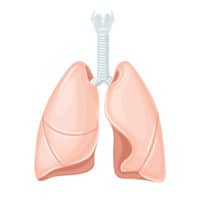October is Healthy Lung Month
 Lung disease often leads to permanent impairment or death. According to the Lung Institute, 25 million Americans are diagnosed with asthma annually, 10 million are diagnosed with chronic bronchitis, and nearly 5 million with emphysema. October is Healthy Lung Month, a good time to consider the best ways to protect these vital organs.
Lung disease often leads to permanent impairment or death. According to the Lung Institute, 25 million Americans are diagnosed with asthma annually, 10 million are diagnosed with chronic bronchitis, and nearly 5 million with emphysema. October is Healthy Lung Month, a good time to consider the best ways to protect these vital organs.
You can choose to protect your lungs by not smoking or vaping, but your control over the air you breathe is limited. There are ways employers can improve air quality in the workplace, and ways employees can help.
Lung Disease Symptoms
Many initial symptoms of various lung diseases are similar, so it crucial to visit your doctor for a definite diagnosis. Symptoms may include:
- Coughing
- Coughing up blood
- Chest pain
- Overproduction of mucus
- Shortness of breath
- Wheezing
Common Work-Related Lung Diseases
Although lung disease occurs more often in some occupations than others, everyone is vulnerable to work-related lung disease. Office workers may find themselves suffering due to poor indoor air quality. Common work-related lung ailments include:
- Asthma – If asthmatic symptoms only occur at work, it is likely something in the workplace triggers the condition.
- Bronchiolitis obliterans – Certain chemical inhalation at work can destroy the bronchioles, leading to chronic lung diseases.
- Chronic Obstructive Pulmonary Disease (COPD) – Long-term exposure to inhalants at work can cause COPD. Roughly 20 percent of COPD diagnoses are occupational.
- Fibrotic lung diseases – Inhaling mineral dust such as silica or asbestos can lead to fibrotic and deadly diseases such as silicosis or asbestosis.
- Lung cancer – Exposure to diesel exhaust, asbestos or silica at work can result in lung malignancies.
- Lung infections – Contamination of work equipment or exposure to infected workers can lead to serious lung infections, including tuberculosis.
Reducing the Odds of Lung Disease
No matter the working environment, there are ways to improve air quality and ventilation and reduce the odds of developing lung diseases. First, it is imperative for workers to follow safety instructions, such as wearing protective masks when at risk of exposure to dust, fumes and other irritants. Other ways to improve air quality in the workplace include:
- Providing plants – Besides their attractive appearance, indoor plants work as air purifiers. Placing lots of greenery in the office space and other work areas can freshen the air.
- Replacing dangerous materials, such as carpets containing formaldehyde, with safe products.
- Ensuring the ventilation system is in top condition.
- Using natural cleaning products.
- Avoiding the use of scents and fragrances.
Lung Issues and the Workplace
Those experiencing work-related lung issues should bring the matter up with their supervisor as soon as possible. You may also want to alert the building manager. If your company has a safety/health officer, notify them of your symptoms. Workers suffering occupational illnesses may be entitled to workers’ compensation benefits.
When visiting your healthcare provider regarding your symptoms, tell them about the type of work you do and your known exposure to any sort of chemicals or other potentially hazardous materials. If possible, bring the material Safety Data Sheets referencing the materials you are exposed to on the job to the doctor’s appointment.
Bucks County Workers’ Compensation Lawyers at Freedman & Lorry, P.C. Represent Workers With Employment-Related Lung Disease
If you developed a lung disease due to working conditions or exposure, you need the services of the experienced Bucks County workers’ compensation lawyers at Freedman & Lorry, P.C. Our dedicated, compassionate team of attorneys fight hard to ensure you receive the maximum compensation available to you. Call 888-999-1962 today to schedule a free consultation or contact us online. We have offices in Philadelphia, Cherry Hill, New Jersey, and Pinehurst, North Carolina serving clients across Pennsylvania.
